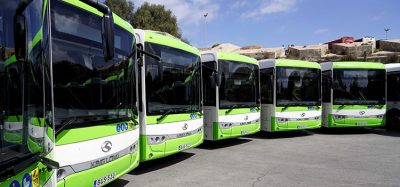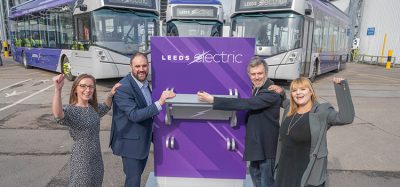Partnership sets out to reduce Los Angeles transport emission
- Like
- Digg
- Del
- Tumblr
- VKontakte
- Buffer
- Love This
- Odnoklassniki
- Meneame
- Blogger
- Amazon
- Yahoo Mail
- Gmail
- AOL
- Newsvine
- HackerNews
- Evernote
- MySpace
- Mail.ru
- Viadeo
- Line
- Comments
- Yummly
- SMS
- Viber
- Telegram
- Subscribe
- Skype
- Facebook Messenger
- Kakao
- LiveJournal
- Yammer
- Edgar
- Fintel
- Mix
- Instapaper
- Copy Link
Posted: 29 November 2019 | Intelligent Transport
The partners of the project aim to work together in 2020 to develop policies, put pilots in place and seek other strategies to achieve the targets set out in the Zero Emissions 2028 Roadmap 2.0.


The Los Angeles Cleantech Incubator (LACI) and its partners have released the Zero Emissions 2028 Roadmap 2.0, a plan to accelerate the deployment of zero-emissions electric cars, buses and trucks, and charging stations across the Los Angeles region. Achieving the Roadmap’s targets and call to action aims to result in cleaner air for LA residents and reduce the region’s transportation sector greenhouse gas emissions, going 25 per cent beyond existing commitments tied to California state law and the Paris Climate Accord.
“We can’t turn the tide on the climate crisis until we work across sectors and city limits to put the brakes on dangerous pollution and kick our zero-emissions transportation future into high gear,” said Los Angeles Mayor, Eric Garcetti. “Our Roadmap 2.0 charts a course toward a healthier region with a cleaner transit network – and draws up a blueprint for cities worldwide to follow, so all of us can invest in the smart policies and green energy that will strengthen our families’ well-being and quality of life for generations to come.”
The Roadmap 2.0 is said to outline how this vision can become a reality for the LA region, with a commitment from public and private members of the Transportation Electrification Partnership (TEP).
“The Zero Emissions 2028 Roadmap 2.0 report doubles down on the bold steps we must take to accelerate clean air and climate action in Los Angeles and across the state,” said Chair of the California Air Resources Board (CARB), Mary D. Nichols. “Together, we can serve as a model for California, the nation, and the world by building a state-of-the-art transportation system that moves people and goods cleanly, efficiently and sustainably throughout the region.”
“Clean air is a critical issue for all of us, especially the communities that have shouldered the burden of our transportation system and the harmful air pollution that it creates,” added Supervisor Janice Hahn, Los Angeles County Board of Supervisors. “The County of LA is proud to be in the Leadership Group of the Transportation Electrification Partnership. I look forward to working with LACI and know that – with this 2028 Roadmap 2.0 as a guide – together we will forge the future of transportation for the health and welfare of all those in our communities.”
For the second edition of the Zero Emissions 2028 Roadmap, the TEP partners have committed to working individually and collectively towards the 25 per cent goal through a three-pronged call to action to ensure:
- Electric vehicles account for 30 per cent of all light-duty passenger vehicles on the road and at least 80 percent of all vehicles sold
- 20 per cent of all trips in single occupancy vehicles shift to zero emissions public transport, bikes or other active transportation options
- All public investments into surface vehicles and related infrastructure for goods movement will advance zero emissions solutions and that the I-710 is the first zero emissions goods movement corridor in the nation.
The TEP partners have reportedly set out to prioritise equity for disadvantaged communities that both lack access to last mile/first mile solutions and disproportionately suffer from health impacts, including asthma and heart attacks, associated with dirty, fossil-fuelled transportation.
In response, TEP and LACI recently announced mobility pilot projects representing a total investment of $500,000 to bring EV car sharing and micromobility to four disadvantaged communities in the LA region that are said to lack adequate mobility options – Pacoima, San Pedro, Long Beach and Huntington Park.
Related topics
Alternative Power, Sustainable Urban Transport
Related cities
Los Angeles
Related organisations
The Los Angeles Cleantech Incubator (LACI)
Related people
Eric Garcetti, Janice Hahn, Mary D. Nichols








